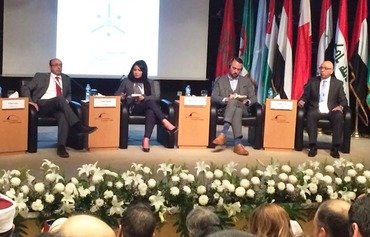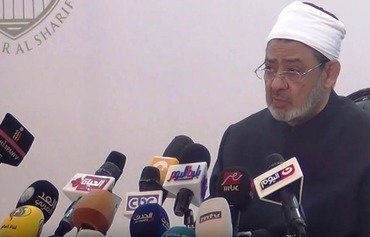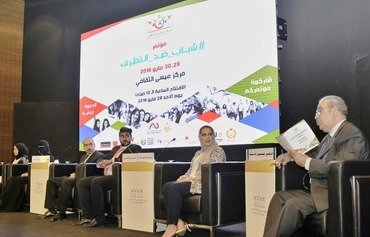Violent extremist thinking must be confronted intellectually and ideologically, Egyptian academics attending a recent conference in Cairo said, suggesting that cultural channels may be the best means of eradicating dangerous views.
This is because terrorists and extremists hide behind many cultural and religious masks, they said, when terrorism has no connection to religion.
The October 24th and 25th conference, sponsored by the Ministry of Culture and organised by the Supreme Council of Culture's political sciences committee, focused on the role of state institutions in combating terrorism.
Discussions centred on ways to counter terrorism, with participants concluding that any confrontation with terrorism must be comprehensive and should involve cultural, media and security forces.
![Panelists take part in an October 24th and 25th conference in Cairo, which focused on the role of state institutions in combating terrorism. [Waleed Abu al-Khair/Al-Mashareq]](/cnmi_am/images/2016/11/11/6552-egypt-conference-terrorism-600_384.jpg)
Panelists take part in an October 24th and 25th conference in Cairo, which focused on the role of state institutions in combating terrorism. [Waleed Abu al-Khair/Al-Mashareq]
Culture Minister Hilmi Nimnim attended the first session, along with a large number of academics and counter-terrorism specialists, many of whom stayed on for the two days of lectures and seminars.
"It is unfair to link the terrorism taking place in the region and spread of terrorist ideology to Islam," Nimnim told Al-Mashareq.
"Terrorism has many faces. Sometimes it hides behind political slogans and other times behind Islam," he said, noting that Egypt has been afflicted by waves of terrorism since 1945, which surface and then disappear after a period of time .
"Terrorism in Egypt has struck and assassinated secular intellectuals and those who espouse moderate Islamic ideologies alike," he said.
"Terrorism’s main goal is to demolish the fundamental concept of the state, homeland and patriotism, and that is because these concepts are the most powerful tools to fight the dark and obscurantist terrorist ideology," he added.
Raising awareness
The conference highlighted the role of education, culture, media, youth and religious institutions "in fighting the scourge of our time, namely terrorism", said Haitham al-Shafei, who lectures at Cairo University's faculty of law.
In each of these various arenas, he told Al-Mashareq, "terrorism can only be stopped with comprehensive and clear confrontation of the terrorist tactics".
It is therefore imperative to raise awareness about the dangers of violent extremist ideology "not only among young educated university students but also at the grassroots level", he said.
Awareness-raising efforts should target young workers in the streets, he said, adding that this can only be done through the media and religious institutions, because they are in direct contact with this segment of the population.
This applies not only to Egypt, but to all countries of the world, al-Shafei said.
Cairo University political science student Munira al-Shafei told Al-Mashareq she was drawn to the conference because of its emphasis on education and its deterrent effect on the spread of terrorism in Egypt and the world.
Primary, secondary and college education are all important in "shaping the students’ actual thinking to ensure they are immunised and capable of fending off terrorist ideas and the attempts by some to instill them" in the minds of youth, she said.
"It is best to work diligently on immunising this segment against terrorist ideas by giving them the opportunity to express their views clearly and to work as much as possible on realising some of their hopes and aspirations," she said.
Such conferences are a "ray of hope for young university students, especially as everyone views them as bulwarks of society, which tends to strengthen their will in resisting alien ideas that some might try to instill in their minds", she added.

![An Egyptian school boy walks in Gharb Aswan village, near Aswan, on March 13th. Panelists at a recent conference in Cairo focused on education and its deterrent effect on the spread of terrorism in Egypt and the world. [Khaled Desouki/AFP]](/cnmi_am/images/2016/11/11/6550-egypt-school-student-600_384.jpg)






